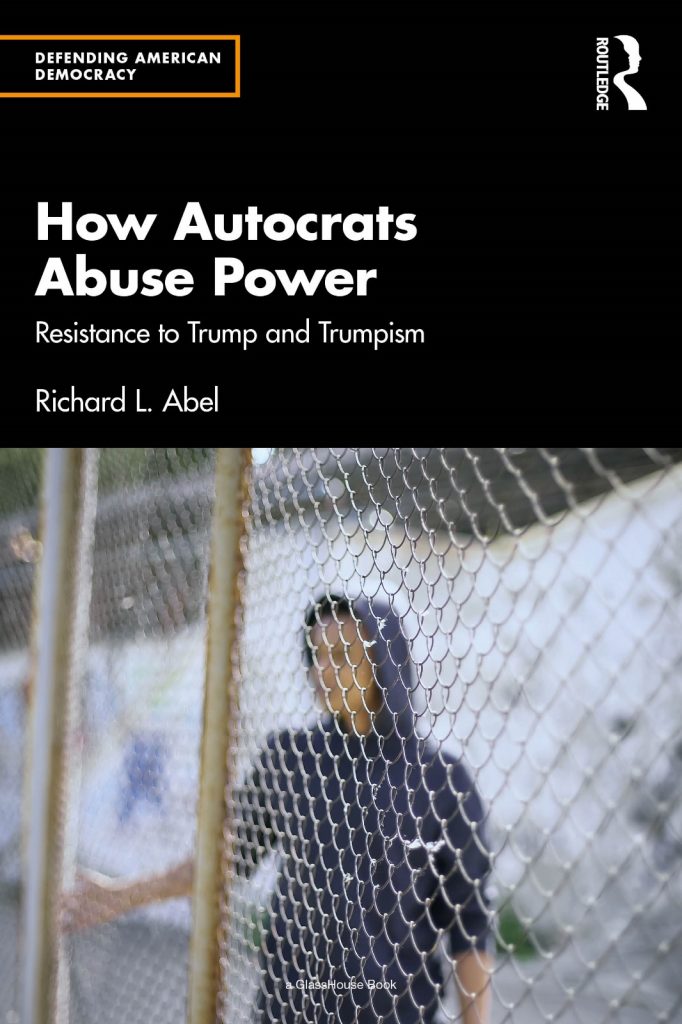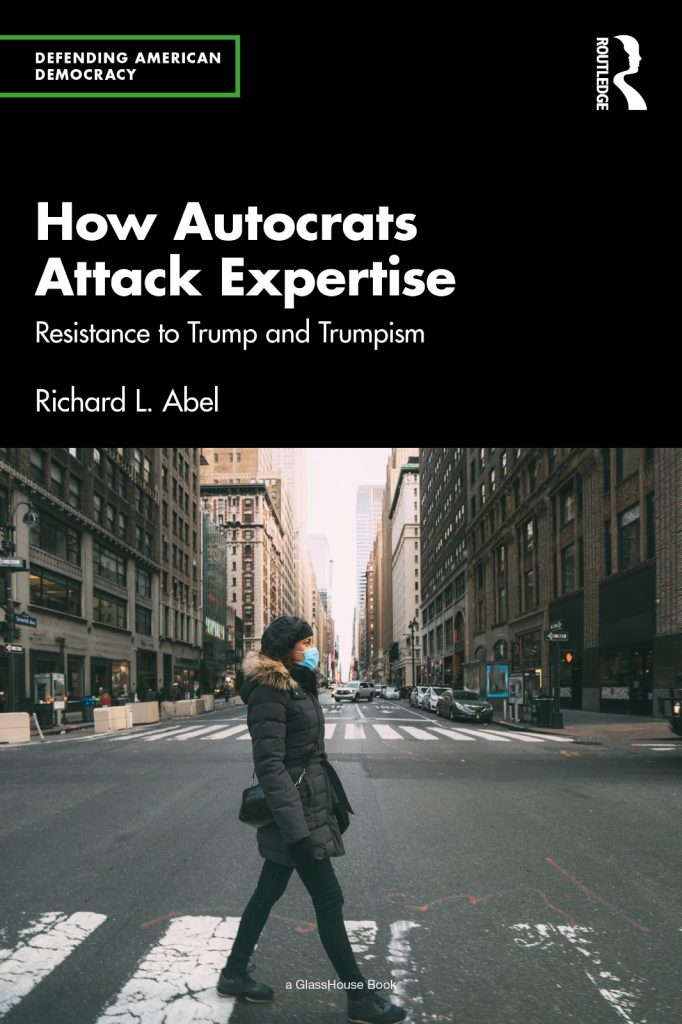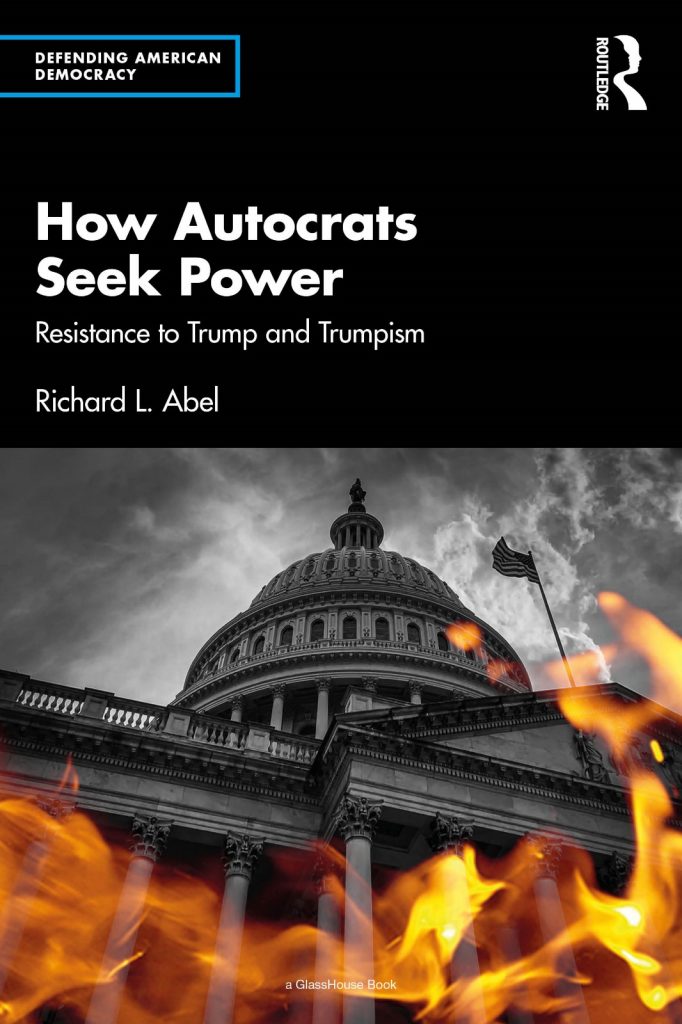Q&A
Defending America Democracy mini-series
A Conversation with author UCLA Law Professor Richard Abel



How Autocrats Abuse Power: Resistance to Trump and Trumpism (December 28, 2023)
How Autocrats Attack Expertise: Resistance to Trump and Trumpism (December 28, 2023)
How Autocrats Seek Power: Resistance to Trump and Trumpism (March 26, 2024)
And in 2025…How Autocrats Are Held Accountable: Resistance to Trump and Trumpism (Routledge; 2025)
Q. Why did you write the Defending America series?
A. I have been interested in the capacity of law to foster and defend liberal democracy for a long time. I went to law school to be a civil rights lawyer, worked on the “one-man one-vote” Supreme Court case, did research for a book about civil rights law, and spent two months as a civil rights lawyer in Mississippi and a year as a legal aid lawyer in New Haven. After law school I spent a year doing fieldwork in Kenya, exploring the role of courts in that newly independent country. In the late 1980s and early 1990s I did field research in South Africa on the (often successful) efforts of ordinary South Africans and their lawyers to challenge the pass laws, censorship, conscription, and land removals, to organize workers and expose torture and killings, and to defend themselves in treason trials. The result was my book “Politics by Other Means: Law in the Struggle against Apartheid,” with a foreword by Nelson Mandela, just installed as president following the first democratic election in South Africa.
Q. How did that lead to your interest in the role of law in defending liberal democracy in the United States?
A. On Sunday, May 2, 2004, I was driving from the Grand Canyon back to my home in Los Angeles. It’s a long straight shot through the desert, so I distracted myself with NPR’s “Weekend Edition.” That featured Seymour Hersh’s explosive disclosure of the torture of Iraqi prisoners by American guards in Abu Ghraib, based on the secret report by Gen. Antonio Taguba. I was transfixed—like so many Americans—but for a personal reason as well. Sy is my brother-in-law, and I remembered vividly when he had broken the news of the My Lai massacre 35 years earlier. I felt an obligation to explore whether the United States would respect the rule of law while waging the “war on terror” declared by President Bush. Although the 9/11 attacks were a heinous crime (I was in my office at NYU at the time, less than a mile from ground zero), they did not represent an existential threat to the U.S.; and Trump’s war on Iraq was a multi-trillion-dollar disaster, with dire consequences for Middle East politics. I expected to see much greater fidelity than I had found in South Africa, since the U.S. had a 200-year-old written Constitution with a bill of rights, independent courts staffed by federal judges with lifetime tenure and a long tradition of judicial review, a huge, well-resourced legal profession, which included a dedicated public interest bar, a well-funded media protected by the First Amendment, and a vibrant civil society. Instead, what I documented in my two books, “Law’s Wars” and “Law’s Trials,” was profoundly disappointing: torture, extraordinary rendition, indefinite detention without trial, war crimes, widespread electronic surveillance, the abuse of informants in terrorism prosecutions, military commissions that violated basic due process guarantees, and civil liberties violations.
Q. How did that disheartening experience lead to the present books?
A. When I gave talks about those two books in 2018, the most common question was: You’ve written about the wrongs of the Bush and Obama administrations, surely you’re going to write another book about Trump. My initial reaction was categorical: “No.” Unlike his predecessors, Trump didn’t even pretend to believe in democracy or the rule of law. But after Obama left office, I continued taking notes on Trump’s actions; and when I looked at them four years later, I realized that, once again, I felt compelled to document and analyze the multiple ways in which the Trump administration had betrayed the most fundamental foundations of liberal democracy because those transgressions do represent an existential threat. The result is the three books just published on how he sought to get and hold onto power, how he abused that power, and how he sidelined and attacked experts in his disastrous response to the Covid-19 pandemic. I’m working on a fourth book about the many efforts to hold him accountable since January 6, 2021: the 25th and 14th Amendments, the second impeachment, the House select committee, defamation and other civil actions, disciplinary proceedings against Trump lawyers, and his four criminal prosecutions. That book will also contain a parallel narrative of efforts to reinstall Trump in power by gerrymandering and restricting the franchise and using the hot button issues of immigration and the culture wars to energize his base.
Q. What are some of the unique features of “How Autocrats Seek Power”?
A. The book shows that Trump’s inability to accept defeat has deep roots in his career in real estate and entertainment. That inability manifested itself as early as 2012; Trump refused to acknowledge the assistance he received from Russia in 2016 and laid the groundwork for questioning the defeat he anticipated in that election. His behavior intensified in 2020, when his atrocious mishandling of the Covid-19 pandemic contributed to his low polling numbers. The book traces his election denialism over more than 12 months, including attacks on mail-in voting and drop boxes, groundless lawsuits, brazen pressure on state legislators and election officials, bizarre conspiracy theories, proposals to declare an emergency and use the military to seize voting machines and to replace the Attorney General with a loyal supporter; and it culminated in his call to supporters to come to Washington on January 6 for what he promised would be a “wild” demonstration and follow him into the Capitol to prevent Congress from certifying his defeat. But as I show, Trump failed to overturn his defeat because judges rejected his numerous challenges (despite divisions along political lines), many state election officials loyally fulfilled their statutory obligations, the Justice Department (including his appointees) found no evidence of fraud that could alter the outcome, and politicians from both parties (including his own Vice President) certified Biden’s victory.
Q. You mentioned Trump’s response to the pandemic; how did that threaten liberal democracy?
A. Americans have benefitted profoundly from the extraordinary advances of science over the last two centuries—in our standard of living (including modes of communication and transportation), health and life expectancy, even in our forms of recreation. But dependence on science—and all specialized expertise—also can breed fear and resentment. And those sentiments can be exploited for political purposes. We have seen that in the past, in campaigns concerning foods, medicines, cell phones, and now artificial intelligence. But Trump embodied this ambivalence toward expertise in his own, unique way. He boasted that he “never” had time to read but nevertheless reached the right decisions because he had “a lot of common sense.” He famously called himself a “very stable genius.” He sought to use the pandemic as an opportunity to bash China. He declared premature victory over the pandemic and then blamed the rising number of cases on testing. He muzzled government scientists and reviled those who defied or evaded his directives as traitorous members of an imaginary “deep state.” He relied on obscure scientists (most prominently, one with no expertise in epidemiology or virology), who promoted quack cures and opposed effective preventive measures. All this caused Americans to suffer an estimated one million unnecessary deaths. Yet science pushed back, saving innumerable lives. Public health officials, independent scientists, and scientific journals and associations bravely spoke out. The pharmaceutical industry produced an extraordinarily effective vaccine in record time and backed the FDA in demanding that it follow all the regular protocols for approval.
Q. How else did the Trump administration abuse its autocratic powers?
A. Trump made attacks on immigration the basis of his 2016 campaign, the focus of his early years in office (until it was displaced by the pandemic), and again a central issue in his 2020 campaign. He attacked immigrants in racist terms, demanding a clearly unconstitutional “Muslim” ban, reviling Africans who came from “shithole” countries, and calling Mexican and Central American immigrants rapists and murderers. He sought to ban Muslims, detain children and separate them from parents, divert military funds to build the border wall, ask about citizenship on the census, and limit asylum. But his harsh measures provoked resistance by religious leaders, business executives, lawyers and bar associations, and civil servants. And because Republicans did not control Congress, he had to rely on executive orders—all but one of which were struck down by federal courts (although judges again split on predictable political lines).
Q. Why should we care about Trump’s efforts to manipulate and overturn elections?
A. Trump is nothing if not consistent. After leaving office (while slighting Biden’s inauguration) he has kept repeating the thoroughly discredited claims that he won the 2020 election and has laid the groundwork for making similar claims about 2024. Republicans have spent the past four years gerrymandering electoral district boundaries. State election officials have been threatened, and many have resigned. Red states have sought to control elections in their blue cities.
Q. What are the long-term effects of Trump’s attack on science?
A. There has been a decline in vaccinations—most pronounced for the essential covid boosters but unfortunately extending to the essential vaccinations children long have received before starting school—with potentially disastrous results. Scientists are warning of new viruses, more contagious and deadly, which will again require compliance with preventive measures as well as willingness to take new vaccines. Americans already had less faith in science than those in other advanced industrial societies: more than half of Republicans and a third of Democrats reject evolution. Trump has vowed to destroy the “deep state” and promised to revive Schedule F, stripping a vast swathe of civil servants of job security and exposing them to replacement by political hacks.
Q. In what other ways might Trump abuse his powers in a second term?
A. In his first term, Trump shamelessly weaponized the Justice Department to protect cronies like Roger Stone, Michael Flynn, Paul Manafort and Rick Gates, by having his Attorney General and other DoJ officials replace career prosecutors and withdraw charges. He could do the same in his two pending federal prosecutions. He also used his unlimited power to pardon those cronies and convicted war criminals, as well as major donors. He has since vowed to pardon more than a thousand January 6 rioters convicted in federal court, lauding them as “political prisoners” and hostages. And he notoriously talking about pardoning himself. He has promised the largest deportation in U.S. history and threatened (illegally) to use the military to guard the border. And he has enthusiastically jumped into the culture wars, lashing out at critical race theory, the teaching of history, and transgender rights.
Q. What else do we have to fear in a second Trump administration, and what can be done about it?
A. In his first term, Trump surrounded himself with sycophants. He had said in 2007: “I value loyalty above anything else, more than brains, more than drive, and more than energy.” He relied on Stephen Miller, who had no legal training, for really bad advice on the numerous executive orders that courts repeatedly struck down. Even his Attorney General, William Barr, called Trump’s lawyers a “clown show.” Next time Trump will have better qualified advisers. Since he will be term limited, he will not moderate his extremism with an eye to the next election (since he cares only about himself, not his party).
Although Trump remains a defendant in four criminal cases, none of those is likely to be decisive in the 2024 election (and many, perhaps all, will not be completed until after it). I am (sadly) confident that at least five of the six Republican Supreme Court appointees will reject the argument that Trump is disqualified as an insurrectionist under the 14th Amendment.
Trump’s core supporters have shown themselves immune to facts and arguments. Independents may be open to persuasion, especially as evidence emerges in Trump’s criminal prosecutions. But the single most important variable is turn-out. Democrats have to get out the vote for a candidate about whom many party members are unenthusiastic. The fate of liberal democracy depends on it.